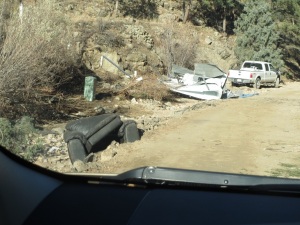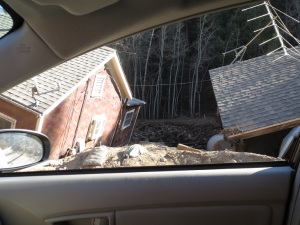I’ve mentioned before that we live near a mountain range, right? And have I mentioned that the sun makes a big difference in temperature? Well, that’s true in the cold as well as the heat. The sun shining on me at 11:15 this morning, for example, made me doff my coat in forty-five degree weather. And I was perfectly comfortable. But the ridge closest to our house hides the sun at about 4:05 pm these days (and getting earlier!). So I find myself racing to get out the door to get my walk in before it gets shady and cold in these here parts.
Now, something I’ve also probably mentioned once or twice is that I have a son, yes? You’ve heard about this? Yes, he’s a rip-roaring three-year-old, and he pretty much wears me out every day. When I put him down for his nap at 2pm every day, I have to take a nap, or I will die. I think that may even be a verifiable medical fact. Not sure. I haven’t had the guts to test it.
Are you getting the idea here? I have to nap at two (to avoid death), and I have to finish my walk by four. I’ll add into the mix the fact that I’ve had insomnia for the last three nights. So today, I lay down at 2:15, tried to read for about thirty seconds, and then fell asleep. I didn’t wake up until after 3:30. When I saw the clock, I sat bolt upright in bed, like I was having a heart attack. I remember waking like that on mornings when I had to catch a flight or get to work on time, but this was getting a little ridiculous.
To make matters more complicated, I decided to go out without a coat, since it had been so warm earlier. Dumb, dumb, dumb. And because I was still disoriented from the nap, it took me nearly twenty minutes just to get my shoes and scarf on. And even though the sun was technically above the ridge when I left the house, I walk in a neighborhood with houses in it. (Shocker, I know.) And they blocked the sunlight. So I was in shade most of the way, shivering and beating myself up for being so lazy, stupid, selfish, and Communist. (May as well throw in everything.)
It occurred to me on this chilly walk, which I admit I shortened to avoid the cold, that what I have been doing with my walks, I also do with my life. I’m racing the sun, trying to fit in everything before I die. Or before bedtime. Or before the first of the month. Or whatever deadline exists, either real or imaginary. I don’t fool myself. Many of my time limits are self-imposed and arbitrary, but death is one I can’t fudge. That’s for real, and whether or not my conscious mind admits it, that deadline – no pun intended – runs me.
I guess it runs a lot of us. There’s even a country song about “rushing, rushing, till life’s no fun.” And that’s a country song, one of the more laid back musical genres in existence. But maybe we – I – are rushing and panicking about all the wrong things, because we don’t want to look at the big thing. We have so little time on this planet. I didn’t even realize it until I turned forty, and now it seems more true every year. Every month. Every day. It doesn’t really matter if I get the cranberries cooked in time for Thanksgiving dinner. Or if I get in a thousand words of writing instead of nine hundred tonight.
What matters is this sense of urgency deep inside me to live my life to the fullest, to stop wasting time, to pay attention. Lately, Brian has been very tired. Not normal tired, or even normal-with-a-kid tired. His energy levels are way too low. He’s seeing a doctor about it; two, in fact. He thinks it may still be the Paxil withdrawal, but his biggest fear is that he will never find out what’s wrong, and he’ll never get better. This is a pretty serious development for someone who wants to climb mountains for a living. And I don’t know what to do. I can’t help him. I don’t have the answer. And I want to fix him.
I want to fix him for my sake, so he can rush around alongside me, doing all of the things that make our household run. I want to fix him for his sake, so he is happy and strong and hopeful again. I want to fix him for Jack’s sake, so he can be tickled and joked with and chased and held. But I can’t fix him at all, and this is causing me more anxiety than I have been willing to admit even to myself.
But maybe what I really, really, really need to do is slow down. Listen to my husband and hold him and cry with him and let him know, over and over, that we are in this together. Because that is the only truth I am sure of, right now.
And maybe, maybe, this slowing down thing will be enough.





